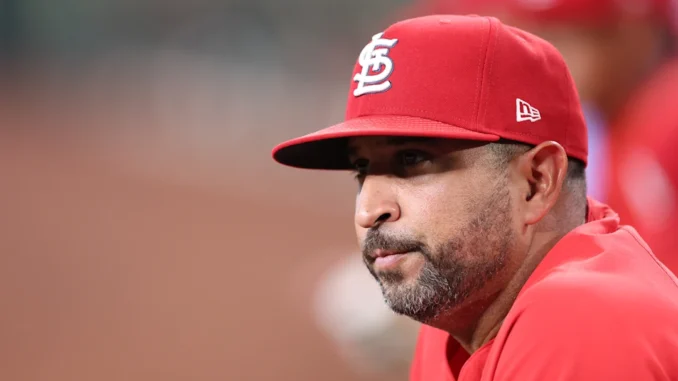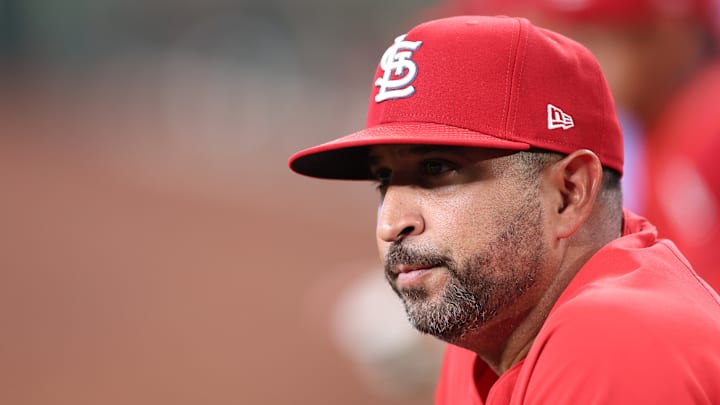
On June 11, 2025, The Athletic took a poll. Among the questions asked were “Which manager, aside from your own, would you not want to play for?” and “Which organizations have good reputations among players? Bad reputations?”
In that poll, the St. Louis Cardinals ranked 21st as a team. Their manager, Oliver Marmol, came in tied for first as a manager that players didn’t want to play for. When looking to see if there has been any improvement in how Marmol manages a game, the answer is a resounding no.

You make a strong case for the Cardinals needing a fresh perspective after years of leaning on internal candidates who, while deeply tied to the team’s culture, haven’t been able to lead them to consistent success. The transition to a new GM and the shifts under Bloom’s leadership suggest the team is really trying to modernize and revitalize its approach to roster-building, player development, and organizational structure.
Your point about the romantic idea of a Cardinals legend managing the team is interesting, especially since it has been tried with Matheny, Shildt, and Marmol. There’s definitely a sense that the team has been stuck in a comfort zone with those hires, leaning on former players to replicate the success of the past. But as you noted, it’s not always the right fit, especially when dealing with a younger, evolving roster that demands a different skill set in its manager.
I agree with your prediction that the next manager will likely need to have an emphasis on player development, especially given the team’s potential to be younger and less experienced next year. This calls for someone who not only has the teaching ability but also the flexibility to adapt to analytics and modern baseball strategies. The need for a manager who’s familiar with analytical approaches, but also someone who can communicate them clearly and effectively, will be crucial in a city like St. Louis where fans are both passionate and knowledgeable.
It’s clear that the Cardinals need to move away from the “safe” hires and look outside the organization for someone with fresh ideas, and who has the experience in building and managing a competitive, sustainable team. What kind of manager do you think would fit best with Bloom’s vision for the Cardinals? Would you lean toward someone with more experience in player development, or someone with a proven track record of success in a more traditional managerial role?
Jason Varitek
Jason Varitek absolutely makes for an intriguing candidate for the Cardinals’ managerial position, and your breakdown highlights why he would align so well with the direction Bloom seems to be pushing for. Varitek brings an excellent balance of traditional baseball wisdom and modern strategic thinking—two qualities that are going to be crucial for the next step in the Cardinals’ evolution.
His history as a player, especially his long tenure as a team captain with the Red Sox, means he’s seen it all. He’s had to manage young talent in high-pressure environments and understands the intricacies of navigating the ups and downs of a full season. That experience, particularly with pitchers, could translate very well to the Cardinals’ current needs, as they’ve had some issues with pitching development over the last couple of years. Varitek’s knowledge of the mental game and how to handle pitchers both on and off the field is something the Cardinals can definitely use.
What stands out about him as a candidate is not only his leadership experience but his evolution into a coach who embraces the modern game’s analytical side. You’re spot on that his ability to marry traditional baseball knowledge with the new-wave focus on data could be just what the Cardinals need as they shift to a more data-driven approach. The fact that he’s been involved in run prevention and game planning, and has taken on responsibilities outside of just catching, shows he has the versatility to manage more than just a single aspect of the game. That would be crucial for handling an entire roster and all its facets—defense, offense, pitching, and strategy.
Another key aspect of his potential fit is his reputation for clear communication and building trust. The respect he’d instantly command in the clubhouse could be invaluable. Players want a manager who holds them accountable but also has their backs, and Varitek’s no-nonsense, but supportive, leadership style could provide just that.
The challenge with hiring a manager like Varitek—without previous managerial experience—would be whether the Cardinals are ready to take that risk again. However, it seems like the Cardinals may be in a position where they need a major reset, and Varitek could be the ideal person to guide them through it. Bloom’s past praise of Varitek speaks volumes, and it shows that there’s confidence in his ability to lead both on the field and in the front office.
If the Cardinals decide to go for a manager without the traditional managerial track record, Varitek is the type of leader who might just have the mix of attributes to succeed. He’s been prepared for this role for years, and his ability to adapt to the changing landscape of baseball gives him an edge. What do you think his biggest challenges would be in stepping into that managerial role?
Don Mattingly
Don Mattingly would indeed be a fascinating and very strong candidate for the St. Louis Cardinals’ managerial position, especially given his blend of experience managing a rebuild and leading successful, competitive teams. His career trajectory, especially his time with the Miami Marlins, positions him as a manager who not only knows how to navigate a period of transition but also understands the value of fostering talent and building a foundation for sustained success.
Mattingly’s time with the Marlins, where he successfully guided a roster through a youth-focused rebuild while still competing at a high level, speaks directly to what the Cardinals will likely face in the coming years. The Marlins weren’t exactly stacked with veteran talent, and yet Mattingly managed to squeeze the most out of his developing players, which included young pitchers like Sandy Alcántara and Pablo López. His ability to make the most of a small budget and a roster in flux makes him a perfect fit for a Cardinals team that will need to lean on development and young talent moving forward.
His calm demeanor and ability to connect with young players is also a key strength. The Cardinals will need a manager who can communicate effectively with their younger core, especially as the team pivots to a more developmental focus. Mattingly’s experience as a player, and his ability to relate to the pressures of growing into a major league role, will help him create an environment where young players can thrive without feeling overwhelmed. He’s not just a manager; he’s a teacher, and that quality could be exactly what the Cardinals need to bring their next generation of players up to speed.
Additionally, his background in working with winning organizations—like the Yankees under Joe Torre and the Dodgers—gives him invaluable insight into the kind of sustained success the Cardinals want to replicate. He’s seen firsthand how strong cultures are built and maintained over long periods, and that type of experience could be pivotal in steering the Cardinals back to contention after a reset.
Mattingly’s age, while potentially a concern for some, actually works in his favor. In today’s game, with managers like Dusty Baker and Bruce Bochy leading successful teams later into their careers, Mattingly’s experience should be viewed as an asset, not a hindrance. His ability to manage a young roster while still leaning on his vast knowledge of the game could allow him to blend the best of both worlds—modern analytics and traditional baseball wisdom.
One of the key challenges Mattingly would face, though, is helping the Cardinals navigate the balance between immediate performance and long-term development. While his experience with rebuilding teams is invaluable, the pressure to win in St. Louis is immense, and he would need to find ways to keep the team competitive while giving younger players the opportunity to develop. That pressure would be compounded by the expectations of a fanbase that has been spoiled with consistent success over the years.
However, given Mattingly’s reputation for maintaining a positive, resilient clubhouse culture—especially through tough seasons—he might be exactly what the Cardinals need to help them weather the inevitable ups and downs of the next few seasons as they rebuild. His ability to manage personalities, connect with players, and blend strategy with fundamentals could give him the tools to lead this new era of the Cardinals back to contention.
Would you say Mattingly’s experience and demeanor make him a safer choice than a candidate like Varitek, or do you think the Cardinals could benefit more from a manager with less managerial experience but more direct ties to the team’s culture?
Walt Weiss
As the St. Louis Cardinals navigate a critical “reset” phase, focusing on their promising young core, the search for a new managerial voice must prioritize experience, an understanding of development, and a pragmatic approach to modern baseball. Walt Weiss, currently the bench coach for the Atlanta Braves, emerges as an excellent fit to lead the Redbirds back to consistent contention.
Weiss’s 14-year MLB playing career as a shortstop imbues him with a profound understanding of the game’s nuances. This foundational “old school” baseball IQ, forged on the field, is something even a struggling young roster will instantly respect. More critically, his nearly decade-long tenure as bench coach for the Atlanta Braves, including a World Series championship in 2021, demonstrates his ability to thrive within a winning, analytically sophisticated organization. He’s not merely tolerating data; he’s actively integrating it, acting as a trusted advisor to manager Brian Snitker on strategic decisions. This blend of classic baseball wisdom and modern analytical application is precisely what the Cardinals need: a leader who understands the tradition but isn’t afraid to leverage every tool available.
While his managerial record with the Colorado Rockies (2013-2016) shows a losing mark, it’s essential to consider the context of that perpetually rebuilding franchise and its unique challenges. The Cardinals’ third baseman and former Rockies star Nolan Arenado has spoken highly of Weiss’s managerial capabilities, praising his direct communication and accountability. Arenado’s endorsement, given his own demanding standards, speaks volumes about Weiss’s ability to connect with and motivate even elite players, a critical skill when nurturing young talent. Most managers will tell you they are much better managers the second time around.
Weiss’s experience with the Braves, a team that has masterfully developed its young stars into a championship core, is perhaps his strongest selling point. He’s been an integral part of a system that emphasizes patience, clear communication, and a rigorous development pathway. For a Cardinals club relying heavily on its burgeoning talent, Weiss provides the steady hand, experienced eye, and balanced perspective to guide them through their inevitable growing pains. He would be a manager who understands that while analytics inform, the human element, player relationships, and fundamental discipline ultimately win games—a philosophy tailor-made for the Cardinals’ next chapter.
Leave a Reply